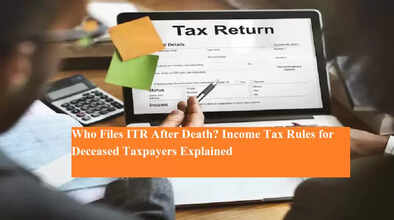Who Files ITR After Death? Income Tax Rules for Deceased Taxpayers Explained

Even After Death, Taxes Remain: Here’s How Legal Heirs Can File ITR for a Deceased Person in FY 2024–25
The Income Tax Department of India has clear guidelines for situations where a taxpayer passes away before filing their income tax return (ITR). If a person had taxable income in the previous financial year but dies before they could file their return, filing ITR on their behalf becomes the legal responsibility of their heir or legal representative.
As per the rules, the legal heir must file the return within the same deadlines applicable to regular taxpayers. For Financial Year 2024–25, the last date for filing income tax returns is September 15, 2025. Missing this deadline may attract penalties and even legal consequences.
✅ Is It Mandatory to File ITR After Someone's Death?
Yes. If the deceased had taxable income in the previous year, their ITR must still be filed. Death does not absolve an individual of their tax obligations for the income earned while they were alive.
For example, if someone passed away in December 2024, the ITR for FY 2024–25 should cover the income earned from April to December 2024. The responsibility to file lies with the legal heir, who must complete the process before the standard deadline.
Failure to do so can lead to:
-
Penalties
-
Interest on due tax
-
Notices from the Income Tax Department
-
Legal liability for the legal heir
👨⚖️ Who Can File the ITR for a Deceased Person?
The income tax return of a deceased taxpayer can be filed by:
-
Their legal heir or legal representative
-
A person nominated in the deceased's will
-
A representative appointed by a court of law
In the absence of a will, the legal heir may be:
-
Spouse
-
Children
-
Other immediate family members
The legal heir must register themselves on the Income Tax e-filing portal using their own PAN and then request access to file the return on behalf of the deceased person.
📄 Documents Required for Filing ITR of a Deceased Taxpayer
Filing the return involves gathering the necessary financial and legal documents:
-
PAN of the deceased
-
Form 16 (if employed)
-
Details of investments made in the last financial year
-
TDS certificates
-
Bank account statements
-
Proof of deductions (under sections like 80C, 80D, etc.)
-
Death certificate of the deceased
-
Legal heir proof (such as a succession certificate or family tree document)
-
ID proof of the legal heir
🧾 How to File ITR as a Legal Heir – Step-by-Step Guide
Here’s a quick process to follow if you need to file ITR for a deceased family member:
-
Log in to the Income Tax e-filing portal using your PAN
-
Go to ‘My Account’ → Register as Representative
-
Choose the option ‘Register as Legal Heir’
-
Upload the required documents (death certificate, legal heir proof, etc.)
-
Once approved by the IT department, you will be allowed to file the ITR on behalf of the deceased
-
Use the deceased’s financial details to complete the return
-
Submit and e-verify the return using the appropriate method (OTP, Aadhaar, etc.)
🔁 Do You Need the Deceased Person’s PAN?
Yes, the PAN of the deceased is mandatory for filing the return. All financial records must be accessed using this PAN, even though the actual filing is done by the legal heir.
📅 Important Deadline to Remember
While the standard ITR deadline is July 31, this year, the government has extended it to September 15, 2025, for FY 2024–25. This deadline applies to legal heirs as well. Filing after the deadline may attract a late fee under Section 234F and other applicable charges.
⚠️ What If You Don’t File?
If the return is not filed:
-
The IT Department may issue a notice
-
Legal heirs may face tax scrutiny
-
Penalties and interest on unpaid tax could apply
In extreme cases, the IT Department may take legal action against the heir under the Income Tax Act, 1961
📝 Final Word
Death does not end tax obligations—at least not immediately. The onus of settling tax matters, including filing the final income tax return of the deceased, lies with the family, legal heirs, or appointed representatives.
To avoid legal hassles and penalties, ensure the ITR is filed accurately, with all necessary documents, and within the due date.

